Having read my book, some people might be quick to label me ‘pro-Nazi’ or ‘anti-Semitic’. However, such an assessment would suggest that they are susceptible to propaganda, making them philistines and nationalists. This would be a mistake. The author is neutral and believes that anyone who plots the murder of millions of people is equally flawed.
Regarding anti-Semitism, Theodor Herzl, the Austrian Jew and founding father of Zionism, wrote the following in his work The Jewish State: ‘All nations that accept Jews are explicitly or covertly anti-Semitic.’ Herzl divided humanity into Semites and anti-Semites. According to him, if you are not Jewish, then you are anti-Semitic. But don’t let that upset you. All Ashkenazi Jews in Europe are descended from mixed marriages, so each of them has anti-Semitic blood in their veins. In a diluted form, of course. Some of the most gifted and cultured people in history who encountered the tricks of the Jews became anti-Semitic.
This observation led the famous French historian and philosopher Ernest Renan to recognize that “anti-Semitism has always been the hallmark of enlightened minds”.
Emile Zola, a famous writer of the late 19th century: “This accursed race … lives as a parasite among the nations. And in every nation it arranges itself like a spider among its webs…”. The book “Nouvelle Campagna”, 1895. This Frenchman knew what he was saying about, for he was an enlightened individual.
And to quote the wish of another Frenchman who observed the misadventures of these African settlers in Europe: “Until sociologists will not begin to study Jews, the humanity will not be able to cook anything but cat chowder…”. Edward Drummond, French politician and journalist (1844-1917).
The author believes that using alternative sources in his writings is the only way a researcher can help his readers distinguish truth from falsehood. Provided, of course, that readers are inquisitive and capable of analysis.
***
History repeats itself, and at every turn, some events are remarkably similar to those that took place in the past. It is as if history reminds the new generation of the mistakes of the past and, drawing parallels, suggests not to repeat them. But children are stubborn, they do things their way. And having made mistakes, they look for someone to blame for all their failures.
Why do people make wars? A wise Israeli politician once answered this question: “When a country has an external enemy, the people rally around the leader. When a country has no external enemy, the leader fights with his people “.
Here we can extend the logic of this politician’s thought: if the one who came to power starts looking for an external enemy, it means that he is a short-sighted politician. Such a politician does not want to fight with his people and lose power. Do you know such a short-sighted politician who came to power in a country of slaves and invented for those slaves an external enemy?
Parallels, parallels… who among those deceived by propaganda would think of drawing them? Boys play at war, growing teenagers want to shoot at real targets.
And lieutenants dream of general’s trousers with red stripes. Politicians, poisoned with vanity, envy Napoleon and the villain Hitler, they want their names to go down in history too. And the people? The common people are not interested in historical parallels. They want entertainment, cheap vodka, and expensive toys, preferably for free.
After that war, everyone blamed it on one man. Propaganda printed thousands of books about the atrocities committed by his armies in the invaded territories. Of course, the propaganda was silent about those who provoked the war, plunged millions of people into tragedy, and forcibly subjugated them to his ideology. And now, on a new turn of history, there is a new war. A military conflict between two neighbors whose grandfathers sat in the same trenches in that long-ago war. And again the same struggle for territory, the introduction of troops under the pretext of protecting the peaceful Russian population. And now Russians are calling another primitive politician and the evil dwarf the father of the nation, the savior of the fatherland. Just as their grandfathers called the previous evil dwarf Stalin their father. He, too, occupied foreign countries and organized bloody terror against people. The Soviet slaves approved of this and sent their sons to invade foreign lands and impose their slavery on them. Propaganda called Stalin a liberator and even the prisoners loved him. He released them from prisons and camps, but only to form battalions of suicide bombers and drive them into minefields to clear the way for regular units of marauders with the remains of their bodies.
Stalin’s butcher Zhukov, at a dinner party with the Allies, cynically bragged about such demining tactics. The American military men were shocked. The supreme commander-in-chief of British-American troops, General Eisenhower, the future president of the United States, who was present at the dinner, had an epiphany: “We’ve chased the wrong fox! Isn’t the current soviet fox repeating what his predecessor did? People have short memories.
The history of wars is written by the victors. Their writers, demonstrating the flexibility of their spines, praise the ingenuity of the commanders, the heroic self-sacrifice of the soldiers, and the patriotism of the people inspired by the genius of their commander; propaganda sings to his glory. Writers in the USSR have always been characterized by pathological praise of their leaders. But with the death of the next the Soviet writer was the first to spit on the corpse whose aging ass he had kissed only yesterday. Thus, in the military history of the Soviet Union, the brilliant strategists who won the Second World War were Stalin… Khrushchev… Brezhnev. This is why, when reading books about the war written by Soviet authors, one should take into account their gastronomic preferences.
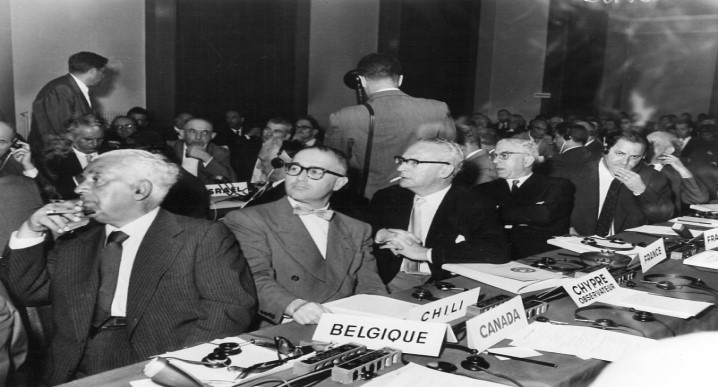
HISTORY OF THE CONFLICT.
When he came to the Reichstag in 1933, Germany’s new chancellor focused on rebuilding the economy and eradicating unemployment. He brought order to the streets and sent criminals and political troublemakers to labor camps. Hitler refused to borrow from loan sharks and introduced a barter system for export and import transactions. Germany began trading with other countries, exchanging its locomotives and tractors, goods, and technology for grain, meat, and all necessary raw materials. The country’s industry was rapidly recovering and people’s lives were returning to normal.
The Rothschild banking empire, which had lost profits on the scheme, saw Hitler as its sworn enemy, watched Germany’s growing power, and longed for revenge. Within two months of Hitler coming to power, the World Jewish Conference, led by these bankers, declared an economic boycott of Germany on behalf of all Jews. This was in effect a declaration of war. In response, Hitler offered German Jews the return of industrial enterprises to German hands, saying that Germany did not need internal enemies and traitors.
He proposed that England buy 600,000 German Jews whom the Zionists could send to Palestine to establish a Jewish state. The Zionists accepted the plan; they collaborated with Hitler afterward and during the war. But the British, who controlled Palestine, did not like the idea. They realized that the Jews would commit genocide there.
The Rothschilds provoked the persecution and deportation of Jews by their declaration of war. In 1938, the extremist Herschel Grynszpan murdered Ernst von Rath, the secretary of the German embassy in Paris. In response to the diplomat’s murder, angry Germans smashed Jewish shops and broke their windows in what became known as Kristallnacht. The Germans remembered that the same murder in Sarajevo had provoked the First World War, which had plunged Germany into a nightmare, and now they demanded the deportation of Jews from the country. After the war, Jewish writers would stigmatize the reaction of the German people, calling it “criminal”. In other words, they blamed others for their sick mind.
Beyond all the fuss over the Jewish question, Hitler had a major plan. His mission was to reunite Germany, torn apart by the Versailles ultimatum, into a single state. By the end of 1938, he had united Germany with Austria and returned to the Sudetenland, home to a large German community since the time of Frederick the Great. Between 1933 and 1939, Hitler presented to European leaders seven peace proposals, which included all possible options for resolving the misunderstandings between neighbors, and the heavy burden of the First World War. The full text of all the German Chancellor’s peace proposals is freely available on the Internet public sources. I will quote some of them here verbatim:
1) 1933. “…Germany will readily disband all her armed forces and destroy even the remnants of her armaments if neighboring states do the same to the same extent…”.
2) 1934. “…All States shall ensure full control over the fulfillment of these obligations. The European nations guarantee each other the unconditional maintenance of peace by the conclusion of non-aggression pacts renewed every ten years….”.
3) On 21 May 1935, Hitler spoke in the Reichstag in the presence of journalists from the world press: “…The German Government is prepared to take an active part in all measures which can lead to a practical limitation of armaments. This means a return to the principles of the Geneva Convention and the Red Cross and means first of all the gradual abolition and prohibition of weapons and methods of warfare which are in themselves contrary to the Geneva Convention and the Red Cross. Here the German government is referring to weapons that bring death and destruction not to troops but to civilians, women, and children…”.
Even the conservative British Times called Hitler’s speech “reasonable, honest and thorough”. But even this proposal did not receive the slightest response from politicians. On the contrary, France allied with Stalinist Russia to increase its influence on the continent and increase the pressure on Germany from the east.
4) In June 1935, a maritime agreement was signed with Great Britain. It was extremely important in the relationship between the two powers as it removed many of the unfair clauses of the Versailles ultimatum. Hitler particularly wanted peace and understanding with the British. Well aware of the history of the first Germanic Hun settlers in the British Isles, he saw the Anglo-Saxons as a kindred people. In making his political and military proposals, Hitler endeavored not to harm British interests, not to offend British feelings. He had a complete understanding with Prime Minister Lord Chamberlain and it was during these years that peace agreements were signed between the two countries in all areas. Winston Churchill, who replaced Chamberlain, went along with the Rothschild bankers who had lost their financial profits in Germany and hated Hitler for it.
Even the opposition welcomed Hitler’s peace proposals. But there was no response from the leaders of the European states. They continued to build up their armaments, especially in neighboring France. The League of Nations, created by the victorious powers, responded to Hitler’s peace proposals by stating that Germany, as a partner in the organization, would have to pass a ‘probationary period’ before it could discuss the question of disarming other countries. Such ultimatums made it impossible to reach an agreement with the organization. Germany announced its withdrawal from the League and invited its members to review their charter under the section on ‘partnership’.
For his peace initiatives and attempts to reach an agreement with the leaders of Europe, Hitler was nominated for the Nobel Peace Prize and named “Man of the Year 1938” by the American magazine The Times.
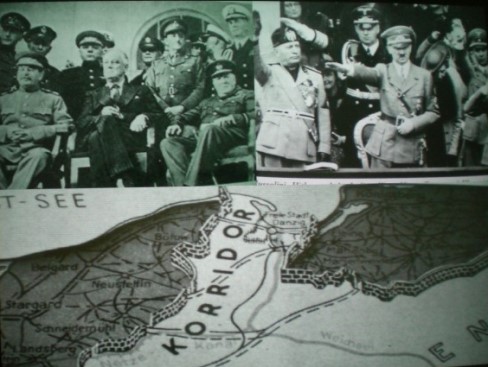
What remained was part of East Prussia, which Poland obtained thanks to the active cooperation of the American president Woodrow Wilson and his bankers’ delegation at Versailles. Through this territory ran a corridor of great economic and strategic importance linking Germany with its main port of Danzig on the Baltic Sea.
Long before, in January 1934, Hitler’s diplomats had signed a ten-year non-aggression pact with Poland. But after Pilsudski’s death the following year, in 1935, the Polish rulers ignored this treaty and the Poles carried out provocative raids and armed attacks on German civilians in Danzig and East Prussia.
After another four years of provocations and disputes, the Polish government, supported by the British and the French, showed its ambition by declaring its unwillingness to return the original German territories to Germany. The terror unleashed on the German population of East Prussia echoed the statements of the politicians. Tens of thousands of peaceful Germans were killed: men, women, old people, children. The survivors fled to Germany. The Poles burned the houses the Germans had abandoned, making it clear to the refugees that there was no going back. When Hitler heard of these atrocities, he said grimly: “They will answer to me for this!
To stop the Polish atrocities, Hitler turned to England and France in 1939, inviting them to mediate and settle the dispute diplomatically. However, the bankers of the Rothschild empire, who had bought the politicians of Britain and France, forced them to sign an agreement with Poland, promising to defend the Poles in the event of a military conflict with Germany. The bankers seized the opportunity to weaken Germany by dragging it into the conflict. In this conflict, the German port of Danzig was the smoldering spark of a great fire.
At the end of August 1939, seizing the last opportunity to resolve the problem peacefully, the German Chancellor presented his proposals for the settlement of German-Polish territorial disputes to the British ambassador in Berlin, suggesting that England engage the governments of Europe in a pan-European meeting. However, Britain continued to ignore Germany’s peace initiatives. Realizing that refusal would be followed by a violent solution to the problem, her Prime Minister realized that many Englishmen would also die in the coming war. The lives of subjects have never in history been an important argument in the game of politicians. In war, soldiers die, and the more deaths, the weightier the justifications of their leaders. And Stalin puffed up his cheeks: “The death of one man is a tragedy. The death of millions is a statistic…“. He watched the unfolding European tragedy from the Kremlin, smoking a pipe and grinning into his mustache. The “friend of all nations” who was friends with Churchill, Roosevelt, and Hitler had his plan. Socialist Stalin, who wanted to take over Europe, was at the time actively helping Socialist Hitler revive Germany’s military and economic power. By helping Hitler, Stalin was waiting for the right moment to turn the situation in his favor. Just as he did with his partners in Russia, destroying them one by one, waiting for the moment. Hitler knew this. He needed help, but his Abwehr was watching every move of the Kremlin’s cheater.
Stalin provided his military training grounds for German pilots and tankers, and the countries worked closely together on armaments, in defiance of the Versailles requirements. The two socialists worked together in secret from the nations, carefully concealed from the world. For this alone, Stalin should have been in the dock at Nuremberg. And his loyal satrap Molotov, who signed the treaty with Germany, should have been hanged next to Ribbentrop on the same gibbet. For Germans, Stalin was a comrade in the struggle, they called him “Komrad Joseph”. All Stalinist propaganda assured the world of the inviolable friendship between the Soviet Union and Germany, and blamed the intrigues of those who wanted to quarrel on “friends”.
Stalin, the master of the cheating game, always had an ace up his sleeve. In the heat of political passion in August 1939, when Poland, backed by Britain and France, showed intransigence in the face of German demands, Stalin unexpectedly pulled out his ace and signed a peace treaty with Hitler. This came as a shock to Western politicians, who had not realized the Soviet dictator’s cunning plan.
In a secret annex to the peace treaty, Stalin and Hitler carved up Poland and demarcated the borders of their possessions in the occupied territories. And they agreed to do it by invading Poland from both sides at the same time. Stalin played his game, he needed a common border with Germany, a desirable condition for a surprise attack! That’s why, after signing the treaty, Stalin laughed and patted himself on the thighs: “I Fooled him! “Fooled Hitler! And began to send offensive armies to his new borders.
THE WAR!
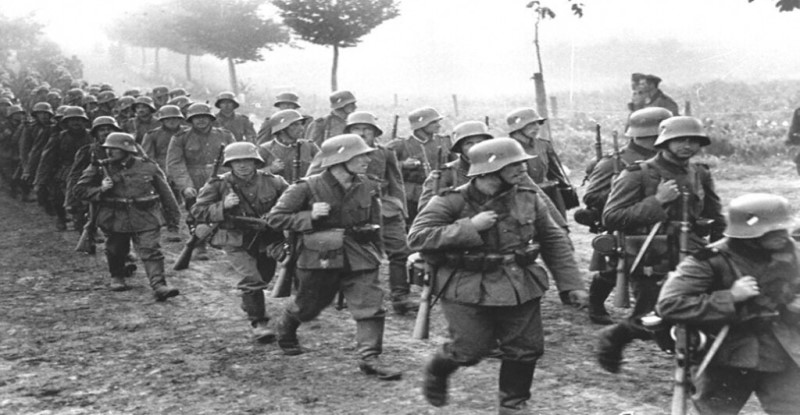
On 1 September 1939, Wehrmacht troops marched into Poland. When diplomats are silent, guns begin to speak. To stop the killing of German civilians by Poles, Hitler forcibly returned the lands of East Prussia. The Polish government, having done the bidding of the British bankers, abandoned its people and fled to London, to its patrons. There it sat out all the years of the war.
On that first day of September, Hitler spoke in the Reichstag, explaining to the foreign diplomats and press the reasons for a violent solution to the conflict. In his speech, he pointed out that Germany had no interests west of its borders and expressed his desire for peaceful cooperation with Britain and France. His speech is available on the Internet.
Hitler moved his troops into Poland from the west, expecting the Kremlin comrade to do the same from the east, fulfilling the terms of the secret agreement. But Stalin waited for the reaction of the Western countries and attributed the delay to the unpreparedness of his armies. Two days later, Britain and France, bound by the treaty with Poland, declared war on Hitler. Only then did Stalin commit troops to Poland. To a world unaware of the behind-the-scenes machinations of politicians, Hitler appeared as the aggressor. Stalin appeared as a liberator, preventing further German occupation of Poland.
The Poles responded to German actions with a new bloody terror in East Prussia. In the first week of September, 58,000 German civilians were killed. This terror was called “Bloody Sunday.” It led to the complete occupation of Poland by German troops. The German command invited politicians and doctors from various countries to demonstrate to them the crime committed against German civilians. Among the witnesses were doctors and diplomats from Chile, Greece, India, Persia, and Italy: Espinoza, Carellas, Faroghi, Ohanian, and Santoro. They submitted detailed reports to their governments, enclosing photographs of the victims of the massacres and testimonies from eyewitnesses and family members who had lost loved ones in that nightmare. After the war, the victors will hide this truth from the nations.
Stalin’s butchers would unleash the Red Terror in Poland, shooting tens of thousands of Poles and deporting tens of thousands more to Siberia. Later, during the war with Russia, the Germans would discover Katyn, the site near Smolensk where 15,000 Polish officers were shot. Stalinist propaganda would blame it all on the Germans. But half a century later, with the fall of the Soviet regime, a document proving who did it would be pulled from the archives and made public. With Stalin’s sweeping resolution across the page – LIKVIDATE! Revenge of twenty years ago for the failed march of Tukhachevsky’s red cavalry into Poland, defeated by Hetman Pilsudski’s army…
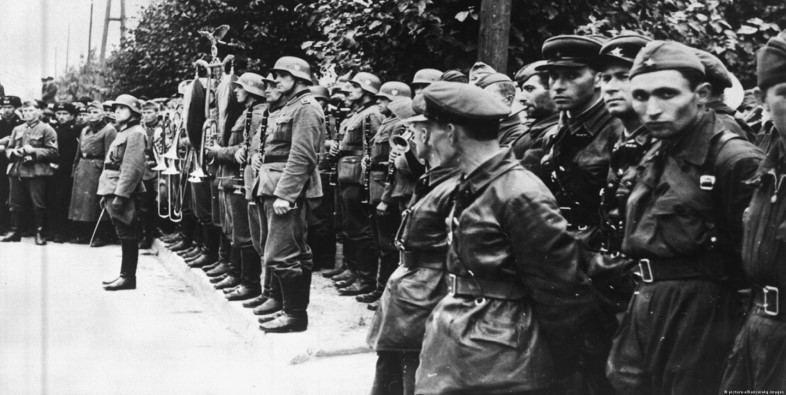
But that will be later, and in early September 1939 the “friends” celebrated victory with a joint military parade in the Polish city of Brest. On the German side, the parade was commanded by General Guderian of the Panzer Forces, and on the Soviet side by General Krivoshein. On both sides, they greeted the columns of the Red Army and the Hitlerites passing under red and black banners with stars and swastikas. The victors’ propaganda will never mention this parade in their books. The victors blamed Hitler for everything. But he was only one of those who unleashed the bloody carnage in Europe.
When England and France declared war on Germany, the whole of Europe was drawn into the conflict. The bankers were rubbing their hands with glee. They’ve done it!
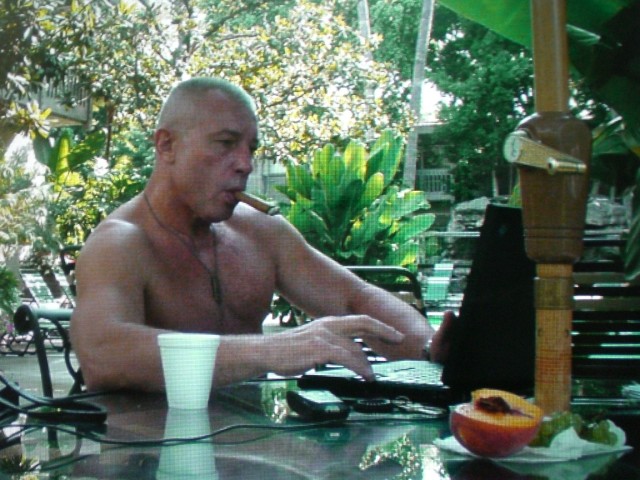
COMMENT.
The history of wars is also written by the defeated. In their books, authors show the military genius of their army and the heroic sacrifice of the army and civilians. They recognize the mistakes of their politicians who thwarted plans to defeat the enemy. But, unlike writers from Soviet Russia, they do not spit on the graves of their dead leaders. Each sees the truth from his trench. It is always in the middle, on the neutral strip, and to get as close to it as possible, you need to study the history of the events of the war on the evidence of those who were in the trenches dug on both sides of this neutral strip. Politicians always lie. That’s why it’s better to believe the soldiers. They are closer to the truth.
In 1939, the French had air superiority, twice that of Germany. France had powerful tanks, artillery, and the latest airplanes. But, having declared war on Germany, the French were in no hurry to fight, hiding behind their Maginot Line. The Germans, in turn, built the same defenses on the border with France, called the Siegfried Line. Here, both sides could lay down thousands of lives in battle. But instead of shooting, the Germans and French played … football. The losers treated the winners to drinks. This period of football warfare is what historians called “weird”. But there was nothing strange about that war. The politicians of France and England were in no hurry to join the fight for Poland. They knew of Stalin’s plans and were waiting for the moment when he would be the first to attack Hitler from the East.
The French love football, wine, and women. Soon many of them were bored with life in the trenches and wanted to go home to their wives. To prevent the soldiers from running home, the Minister of War, Daladier, gave the army… ten thousand footballs, increased the ration of alcohol, abolished the tax on playing cards, and opened brothels. The French appreciated their government’s gifts and stayed in the trenches. One of them, Maurice Thorez, secretary of the French Communist Party, escaped. The deserter was sentenced to be shot but was not caught. He fled straight to the Soviet Union, to Comrade Stalin. There, warm and fed, the deserter sat out the war, and when all was quiet in Europe, Mr Thorez was sent home to work off the Kremlin rations and stir up public opinion.
…AND A POSTSCRIPTUM
In 1939, among the French soldiers playing football on the Maginot Line was Hitler’s son, born to a Frenchwoman, Charlotte Lobjois, who lived in the area where Hitler fought in World War I. Jean-Marie was born in March 1918 and grew up knowing nothing about his father. Shortly before her death, in the early 50s, his mother confessed to her son who his father was. Paintings and drawings were found in the attic of her house. Among them was an oil painting of Charlotte. On the painting was Hitler’s signature.
With the start of the military campaign in 1940, the occupation of Belgium and northern France, Hitler visited the places where he had once fought. From the memoirs of Hitler’s assistant, Heinz Linge, we know that on 19 July 1940, the Führer summoned Himmler for a confidential discussion. The subject was his son and Charlotte. After this meeting, and until the last days of the Third Reich, the family received financial support through a very complicated banking system. Full information on Hitler’s son is available on the internet.
© Copyright: Walter Maria, 2014 Certificate of Publication No.214083100100

Outstanding feature
Real excellent info can be found on web blog.!
I was able to find good info from your content.
This is a topic that’s close to my heart… Best wishes!
I was able to find good information from your articles.
Excellent write-up. I definitely love this website. Keep writing!
Oh my goodness! Amazing article dude! Many thanks!
Pretty! This has been a really wonderful article. Thank you for supplying this info.
I absolutely love your website. Great colors & theme. Did you build this website yourself? Thanks!
A fascinating discussion is definitely worth comment. I think that you need to publish more on this subject, it may not be a taboo subject but typically folks don’t speak about such subjects. To the next! Kind regards.
I want to to thank you for this good read!! I absolutely enjoyed every bit of it. I have you book marked to check out new stuff you post…
I was extremely pleased to discover this website. I want to to thank you for ones time for this fantastic read!! I definitely loved every little bit of it and I have you saved to fav to check out new stuff in your blog.
Aw, this was a very good post. Taking the time and actual effort to generate a top notch article… but what can I say… I hesitate a whole lot and never seem to get nearly anything done.
Hi, this is a great site. I stumbled upon it 😉 I have saved it as a favorite. Money and freedom are the greatest ways to change. May you be rich and continue to guide others.
This blog was… how do I say it? Relevant!! Finally I have found something which helped me. Cheers!
Good post. I certainly love this site. Keep it up!
bookmarked!!, I like your blog.
An intriguing discussion is worth comment. I do believe that you ought to write more on this issue, it may not be a taboo subject but typically people don’t discuss such topics. To the next! Kind regards.
Howdy! I could have sworn I’ve been to this site before but after going through many of the posts I realized it’s new to me. Nonetheless, I’m definitely delighted I stumbled upon it and I’ll be book-marking it and checking back frequently!
Good web site you have got here.. It’s hard to find high-quality writing like yours nowadays. I seriously appreciate people like you! Take care!!
I blog frequently and I truly appreciate your content. This article has truly peaked my interest. I will take a note of your website and keep checking for new information about once per week. I opted in for your RSS feed as well.
Very good article. I definitely appreciate this website. Keep it up!
Your style is really unique in comparison to other people I’ve read stuff from. Thanks for posting when you’ve got the opportunity, Guess I will just book mark this blog.
Aw, this was a very nice post. Taking the time and actual effort to generate a really good article… but what can I say… I hesitate a whole lot and never manage to get nearly anything done.
Your style is very unique in comparison to other folks I’ve read stuff from. Many thanks for posting when you have the opportunity, Guess I’ll just book mark this web site.
Way cool! Some very valid points! I appreciate you penning this post and also the rest of the site is extremely good.
There’s definately a lot to find out about this topic. I really like all of the points you have made.
Pretty! This has been a really wonderful article. Many thanks for providing this info.
I needed to thank you for this great read!! I absolutely enjoyed every bit of it. I’ve got you book marked to check out new things you post…
I must thank you for the efforts you’ve put in penning this site. I am hoping to see the same high-grade content by you in the future as well. In fact, your creative writing abilities has motivated me to get my very own website now 😉
Very good post! We will be linking to this great content on our website. Keep up the good writing.
Good post. I learn something new and challenging on blogs I stumbleupon on a daily basis. It’s always interesting to read through articles from other writers and use something from their sites.